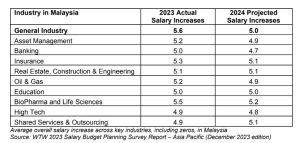A compensation survey by WTW, a leading global advisory, broking and solutions company, reports that employees in Malaysia working in industries such as insurance, banking, tech, media & gaming, shared services & outsourcing, asset management and oil & gas, received a more competitive annual base salary in 2023 compared to those in education, real estate, construction & engineering, biopharma & life sciences.
This is based on a market competitiveness index where the annual base salaries of jobs across industries were ranked against the base salary of jobs from the general industry.
When benchmarked against the general industry, companies in banking, tech, media & gaming and shared services & outsourcing industries have exceeded expectations, offering annual base salaries that surpass the general industry’s overall median. notably, companies in the asset management and oil & gas industries paid the highest annual base salaries last year.
On the other hand, companies in education, real estate, construction & engineering, and biopharma & life sciences lag behind in terms of their annual base salaries’ competitiveness.
For 2024, companies in Malaysia continue to project an overall salary increase of 5% for executives, management and professional employees, and support staff.
Although this is slightly lower than the 5.6% salary increase in 2023, the average salary increase continues to show a steady rise over the last few years.
Similar trends are observed across various industries in the country this year. However, inflationary pressures and concerns over a tight labour market continue to influence factors beyond salary increase budgets.
“Although inflation is slowing down from the heights of recent years, the labour market in Malaysia is shifting. Voluntary turnover and attrition continue to increase and reach a high of 18.5% in 2023 compared to 16.5% in 2022,” said Tan Juan Jim, Head of Work & Rewards, Southeast Asia and Malaysia, WTW.
“This trend looks set to continue in 2024. Employers in Malaysia will continue to face significant talent challenges including the attraction and retention of key talent.”
 “They will need to stay focused on balancing the entire package of rewards they offer, both monetary and non-monetary in order to remain competitive and align with employees’ needs and wants,” he said.
“They will need to stay focused on balancing the entire package of rewards they offer, both monetary and non-monetary in order to remain competitive and align with employees’ needs and wants,” he said.
WTW survey finds that millennials and Gen Z will form more than 70% of the workforce by 2025
The WTW survey also reveals those industries such as banking, insurance, tech, media & gaming, and shared services & outsourcing hired the most number of millennials and Gen Z employees last year.
Since 2020, the Gen Z workforce in Malaysia has grown rapidly at a 50% year-on-year increase in terms of percentage of the total workforce. By 2025, WTW expects that millennials and Gen Z will form more than 70% of the workforce in the country.
“The traditional employment model is losing its inevitability as employees now have the options in the gig and passion economy. The passion economy is one where it is built around creators with a purpose and provides alternative ways of making money, innovative paths towards professional fulfilment and unprecedented career opportunities to the future workforce,” said Jim.
He further added, “In the context of the passion economy, where job security is no longer the primary focus, understanding the emerging group of Gen Z employees becomes paramount.”
Organisations that move towards providing greater work flexibility, including offering a choice of remote, onsite or hybrid working will attract and retain more talent. This trend of working offers Gen Z more options to have multiple side hustles while maintaining their traditional economy jobs,” Jim added.
At the same time, Malaysia’s corporate workforce faces three possible challenges in growing its Gen Z’s population. These include:
- Young talents seeking opportunities abroad (e.g., to Singapore and the Middle East);
- Setback in education by two years due to the pandemic impacts and the accelerated career options fuelled by technology;
- Constant lookout for new positions by the same pool of younger workers to satisfy their needs for flexibility, control over their destiny and scalability of earning through their efforts, and finding work that provides a sense of purpose.
“Winning the talent race will require employers to leverage on analytics to understand their current workforce and forecast future workforce within their organisation. Developing a compelling employee value proposition that encompasses a comprehensive view of total rewards, including both financial and personal well-being benefits, is important for employers in Malaysia to adapt to the unique attributes of the generational and future workforce,” Jim concluded.




































